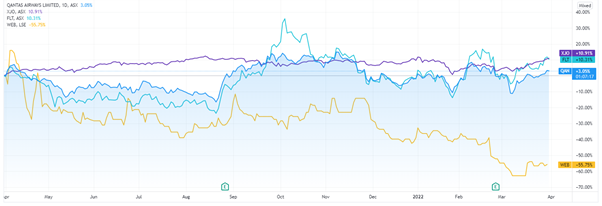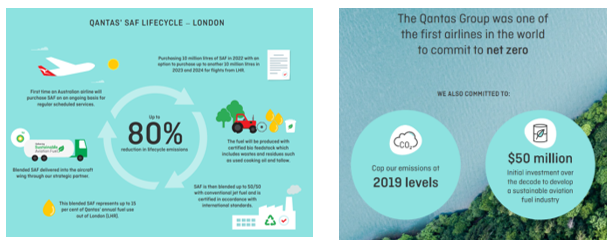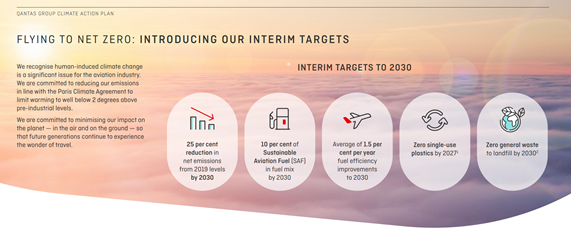Iconic Australian airline Qantas Airways [ASX:QAN] is setting out to reach net-zero emissions by 2050, with an interim target of 25% less carbon emissions by 2030.
QAN shares were flat on the news, trading at $5.26 in the afternoon.
With pandemic restrictions wreaking havoc on travel, the Qantas stock has been understandably turbulent.
QAN is underperforming the broader market by 7% over the last 12 months:
Source: Tradingview.com
Qantas sets zero emissions plan
Qantas is set to become one of the first airlines to commit to net-zero emissions by 2050 after unveilings its climate action plan on Thursday.
On the way to its 2050 net-zero target, Qantas will also aim to reduce its carbon emissions by 25% by 2030.
How is Qantas hoping to achieve its goal?
- ‘Sustainable Aviation Fuel (SAF) — 10 per cent use of SAF in the Group’s fuel mix by 2030, and approximately 60 per cent by 2050.
- Waste reduction — Zero single-use plastics by 2027 and zero general waste (excluding quarantine waste) to landfill by 2030.
- Fuel efficiency — Increase fuel efficiency by an average of 1.5 per cent per year to 2030. Achieved through updating our aircraft fleet and using more efficient flight planning, while continuing research into next generation technologies, including hydrogen and battery power.
- Offsets — continue to build our offsetting program particularly into key Australian projects.’
QAN has given the Australian SAF industry a $50 million boost, hoping all levels of government assist in ensuring Australia manufactures biofuel alongside the UK, US, and Europe.
Source: Qantas
Qantas MoU with ANZ and INPEX
Qantas also announced an MoU with ANZ and INPEX for a reforestation and carbon farming project in Western Australia.
The project aims to cover farms with drought-resistant plants, benefitting the environment and generating Australian carbon credits.
These plants can also become an ongoing source of aviation fuel for Australia.
Qantas Group CEO Alan Joyce commented:
‘Aviation is a crucial industry, especially in a country the size of Australia. Having a clear plan to decarbonise Qantas and Jetstar so we can keep delivering these services in the decades ahead is absolutely key to our future. We’ve had a zero net emissions goal for several years, so today’s interim targets are about accelerating our progress and cutting emissions as quickly as technology allows.’
Source: Qantas
Qantas share price outlook
Qantas sounds serious about its net-zero ambition.
But apart from being a national aviation icon, Qantas is also a business with obligations to shareholders.
Action on sustainability is laudatory — and necessary — but questions will arise as to how QAN’s emissions goals will impact profitability.
Qantas said sustainability will now be a ‘key pillar of decision making’ across all areas of the business.
Presumably so, too, is profitability. But will the two ever clash?
Is Qantas prepared to sacrifice one for the other?
Of course, this assumes that sustainability comes at the cost of profit.
In a world where renewables are becoming ever more cost-effective than traditional fossil fuels, this may very well not be the case.
For instance, in 2021, Qantas sourced 50% of its domestic electricity consumption from renewable sources.
From 2022, QAN expects all group buildings to be powered by 100% renewable electricity in Australia.
This gels with Qantas’s values on sustainability but will also likely lead to a lower electricity bill.
As the ABC reported, Australia ranked 10th lowest among advanced economies for the average price of electricity.
And at the heart of this trend was the ‘surge of low-cost renewable energy coming into the system, which the AEC said was pushing down wholesale electricity costs.’
Now, if Australia could also produce its own sustainable aviation fuel — cutting out the middleman and inflated costs in the process — Qantas could cut costs even further.
As Qantas CEO Alan Joyce commented:
‘Setting these targets now is sending a clear signal that we’re in the market for large volumes of sustainable aviation fuel, for carbon offset projects and for products that can be recycled. That will hopefully encourage more investment and build more momentum for the industry as a whole. Responding to climate change is a big challenge, but we will get there. Partnerships with industry and all levels of government are going to be key to create the supply chains we need, and customers will have a role to play as well.’
Now, it’s commonly argued that things like economic growth and business trends have the biggest impact on stocks.
But that’s not always the case. After all, we invest in a market of stocks, not a stock market.
It’s the bold ideas and serious innovation that can have the biggest impact.
And there are plenty of unheralded Aussie stocks out there innovating and aiming to shake things up with pioneering technology.
They are out there — but are you ready to find them?
Click here to read our latest research report on seven Aussie small-cap stocks to watch.
Regards,
Kiryll Prakapenka,
For Money Morning




